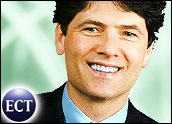
I have been anticipating the Sales 2.0 conference coming up in San Francisco for many reasons. As a certified, bag-carrying sales guy for a number of years, selling is part of me and though I am an old dog, I do enjoy at least hearing about new tricks.
I am also an avid fan of the game and many of my clients have sales-related issues — if not products — on which I consult. My big reason for having interest in the conference is simply to find out if there really is a 2.0 slant to selling.
A Better Way to Sell?
Regular readers of this column might recall that I have held forth before on selling in general and on the virtues of finding a new or better way of doing what we do. The idea of Sales 2.0 has been in my mind for a long time, and issues like selling process vs. buying process as well as CRM 2.0 are things I have written about.
To be honest though, we’ve been at this point before; in fact, we seem to get here regularly because we are always looking for a better way to sell. Finding a better way to sell is the pivot point of the discussion too — whose definition of selling needs to be improved? If you are selling something or managing people who do, when you hear the words Sales 2.0 your mind immediately races ahead to the conclusion that what we’re talking about is faster and easier selling — and why not?
Almost every salesperson knows or recalls a time when selling seemed easier than it does right now, and that’s not nostalgia, I think it’s real. There were at least a couple of times in my sales career when it seemed like I was really taking orders; all I had to do was show up and a deal was mine.
Educating the Market
Those times happen relatively early in a market when a product category is new but when most customers have been minimally educated and their objections have been satisfied. It happened in CRM at the end of the last century going into the first year or two of the new. However, that time inevitably gives way to a period of realistic reassessment. Early adopters discover the pitfalls of the new category, parity develops between a small number of competitors and competition heats up; if there’s an economic slow down, all of a sudden your forecast looks like it was written in a comic book.
The cure for that situation is not inventing a new way to sell but in finding a new thing to sell. If you think about it, salespeople are only employed to educate a market, to bring in something that is expensive, complex and sophisticated. When there’s nothing left to explain and the competition has died down, it’s time to find another job. It takes many years to run that course, but it happens.
What’s interesting about the present is that there is no big new thing for sales people to get behind the way there was when ERP (enterprise resource planning) peaked and CRM became the new darling. True, there are new products on the market, but they don’t really call out for sales people — how many people does it take to sell an iPhone?
Can You Repeat That?
We are in an interesting period of time when companies need and have large sales forces, but selling is a bit of a grind. Geoffrey Moore, who will keynote the Sales 2.0 conference, says it’s a time when we need to get into a mindset of repeat selling to the same customers we may have already sold an earlier product to. I think Sales 2.0 is about what’s different the second time around when the bloom may be off the first rose and the customer wants a better product as well as service, support and so on.
This is also the time when customers have more leverage because they may know they have alternatives and they expect to get exactly what they want or no deal. It’s that environment that makes selling such a challenge today, and it’s why sales people look for a new or better way to sell.
Pay Attention
So, is it even possible to find such a sales nirvana? I think so, and I think the conference might be illuminating. One thing that I am sure will come out is that today’s environment is the real thing and that it’s a far more typical situation to have more offerings than customers and to be fighting for each deal often competing on minutia.
I expect Sales 2.0 to be a lot like selling using disciplined methodologies that make us take the customer’s pulse, understand the business pain and prescribe exact solutions to the specific problem. That’s different from taking orders in the good old days, and it’s harder, too, and it’s why we all get excited when there’s a new category that needs sales people. Until that category emerges, it will be smart to pay attention to Sales 2.0.
Denis Pombriant is the managing principal of the Beagle Research Group, a CRM market research firm and consultancy. Pombriant’s research concentrates on evolving product ideas and emerging companies in the sales, marketing and call center disciplines. His research is freely distributed through a blog and Web site. He is working on a book and can be reached at [email protected].






















































